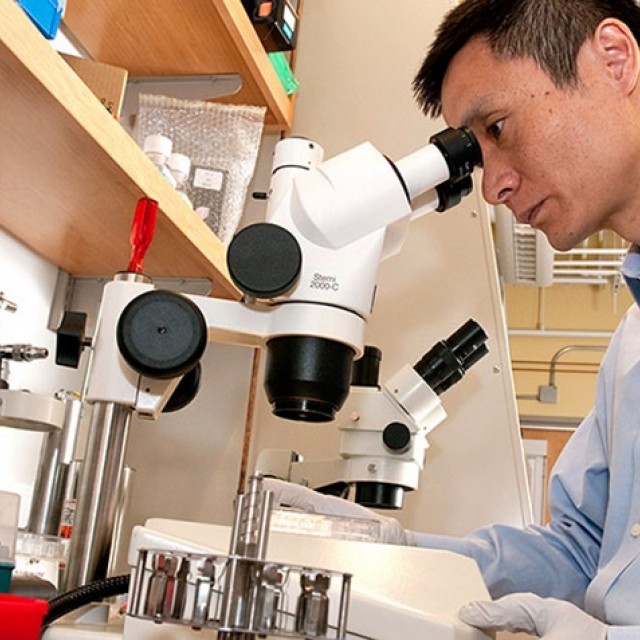
Research
Since its inception in 1892, the University of Chicago has been an institution uniquely focused on academic research. Faculty members have always been encouraged to explore novel ideas and investigate promising leads. Following this tradition, the Department of Radiation and Cellular Oncology supports, and even demands, rigorous research programs from its faculty members.
Current Research Initiatives
Faculty members are free to pursue their personal research interests and funding sources. Currently, researchers are receiving funds from both public and private sources, including the National Institutes of Health (NIH) and the American Cancer Society (ACS).
Our research labs are investigating diverse questions, from the use of nano-particles in cancer treatment to the development of better imaging systems, with the hope that cancer detection, treatment and care will be improved.
Our Research Labs
The Weichselbaum lab has been investigating tumor and host factors that limit metastasis and novel methods of treatment of metastasis. These investigations have evolved into studies of the interaction of radiation therapy and the immune system. These investigations have changed the staging of some cancers and changed the standard of care for many patients with limited metastatic disease as well as established a basis for new clinical trials with checkpoint inhibitors and radiotherapy, and nano-technology and radiotherapy. These investigations have resulted in approximately 100 papers in the past 5 years including papers in high impact journals such as Nature, Immunity JCI, Nature Communications, Science Translational Medicine, Nature Biomedical Eng, and JCO. These investigations have been accomplished with basic science colleagues at the University of Chicago including Chuan He and Wenbin Lin in Chemistry, Steve Kron in MGCB and Hans Schreiber in Pathology . Additionally, the Weichselbaum lab has a long-standing collaboration with Yang Xin Fu at UTSW. Also, translational studies have been performed with colleague in Radiation Oncology and Medical Oncology including but not limited to Steve Chmura, Sean Pitroda and Everett Vokes. Ralph is also a Co-Director of the Ludwig Center for Metastasis Research

Ralph R. Weichselbaum, MD
Chair of Radiation and Cellular Oncology
Daniel K. Ludwig Distinguished Service Professor of Radiation and Cellular Oncology
Committee on Cancer Biology
The Bishop Lab studies the mechanism of homologous repair, emphasizing the recombination proteins Dmc1 and Rad51 that are related to the bacterial repair protein RecA. The investigation considers how Dmc1's function is specialized for meiosis, how the functions of Rad51 and Dmc1 differ, and how these proteins interact.

Douglas K. Bishop, PhD
Professor of Radiation and Cellular Oncology
Professor of Molecular Genetics and Cell Biology
Committee on Genetics, Genomics and Systems Biology

Philip P. Connell, MD
Professor of Radiation and Cellular Oncology
In collaboration with researchers at the University of Denver and the University of Maryland, the Center for Electron Paramagnetic Resonance (EPR) Imaging in Vivo Physiology aims to create new imaging technologies in order to better visualize the tissues of living animals. The EPR imaging technology under development by the Center has powerful implications for the treatment of cancers, strokes, peripheral vascular diseases and heart attacks.

Howard Halpern, MD PhD
Professor of Radiation and Cellular Oncology
Committee on Cancer Biology
Committee on Medical Physics
Dr. Zhou's research aims to understand how protein post-translational modifications (PTMs), and the enzymes involved contribute to cell signaling in diseases and immune regulation, and how these PTMs, enzymes, enzymatic reactions, and related cellular processes can be exploited for targeted therapy. Read more.

Jie Zhou, PhD
Assistant Professor of Radiation and Cellular Oncology
The Center brings together researchers from various areas of expertise, including molecular and cell biology, bioinformatics, chemistry, genetics, imaging and medicine to dissect the basic mechanisms of metastasis using sophisticated, state-of-the-art approaches. Ultimately, the Center aims to further our understanding of what fundamentally controls cancer’s deadly spread and translate laboratory concepts to novel therapeutics to treat and prevent metastasis.